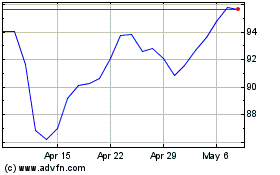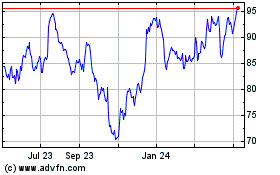Morgan Stanley's Earnings Drop on Sharp Slide in Fixed-Income Revenue -- Update
April 18 2016 - 8:46AM
Dow Jones News
By Justin Baer and Peter Rudegeair
Morgan Stanley said its profit fell 53% in the first quarter
after concerns about the economy limited Wall Street clients'
appetite to trade or make deals.
Earnings beat estimates, however, sending shares up about 3% in
premarket trading. Net income dropped to $1.13 billion, or 55 cents
a share, from $2.39 billion a year earlier. Analysts polled by
Thomson Reuters had expected a per-share profit of 46 cents.
Revenue tumbled to $7.79 billion, shy of the $7.87 billion
forecast by analysts.
Morgan Stanley and other big banks are muddling through a steep
slump in their debt-trading business. The downturn prompted the
firm to cut jobs from the unit, which has weighed down Morgan
Stanley's return on equity, a key measure of banks'
profitability.
Return on equity fell to 6.2% from 13.5% in the first quarter a
year earlier, excluding an accounting adjustment. Morgan Stanley
executives have pledged to lift returns to 9% to 11%.
The volatile markets also conspired to weaken investment-banking
activity in the first quarter, hurting a division that had been a
bright spot last year.
Trading revenue fell 34% to $2.69 billion from $4.08 billion in
the first quarter of 2015, a sharper drop than some peers.
Debt, currencies and commodities trading revenue fell 56% to
$873 million, while the revenue from equity trading dropped 10% to
$2.06 billion.
In an interview, Morgan Stanley Chief Financial Officer Jonathan
Pruzan said January and February were "extremely turbulent" months
for its trading business, but that it saw improvement in March and
so far in April. "The environment is clearly better, client
activity is up a bit... [but] we're going to see bouts of
volatility."
The drop in trading revenue, especially at the firm's
fixed-income business, wasn't as sharp as many analysts and
investors had feared heading into April. Bank stocks have rallied
in the past week in part on relief that the most dire predictions
about the first quarter proved unfounded
Investment-banking revenue fell 16% to $990 million from $1.17
billion in the first quarter a year ago. Fees from advising on
mergers and other deals rose 25% to $591 million, while revenue on
stock and bond underwriting slipped 43% to $399 million.
Mr. Pruzan said that the bank's pipeline for mergers and
acquisitions remains healthy as muted economic growth and the rise
of activist investors continues to spur deals, even in a tough
market backdrop. "A lot of the themes we saw that drove activity
last year still exist," Mr. Pruzan said.
Revenue in Morgan Stanley's wealth-management arm was $3.67
billion, compared with $3.83 billion a year ago. In Morgan
Stanley's investment-management division, revenue fell 29% to $477
million due to losses on its private-equity and real-estate
funds.
The money-management arm also struggled with markdowns on
private-equity investments in the quarter.
Morgan Stanley's firm-wide expenses fell 14% to $6.05 billion
from $7.05 a year earlier. Cost from employee pay and benefits fell
19% to $3.68 billion, or 47% of revenue.
The firm's shares have tumbled 19% this year as investors
fretted over Morgan Stanley's ability to weather the slowdown.
Write to Justin Baer at justin.baer@wsj.com and Peter Rudegeair
at Peter.Rudegeair@wsj.com
(END) Dow Jones Newswires
April 18, 2016 08:31 ET (12:31 GMT)
Copyright (c) 2016 Dow Jones & Company, Inc.
Morgan Stanley (NYSE:MS)
Historical Stock Chart
From Mar 2024 to Apr 2024

Morgan Stanley (NYSE:MS)
Historical Stock Chart
From Apr 2023 to Apr 2024
